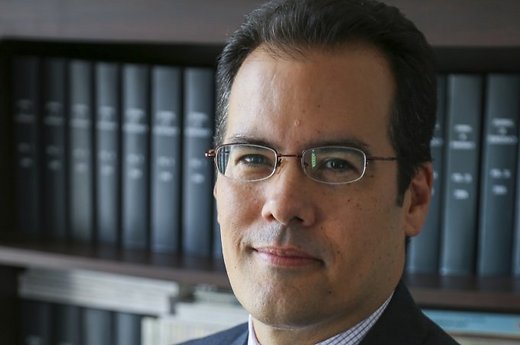| Walker: Russian soft power not really soft |
| Delfi.lt, Vilnius / 4 Oct.'15 / 22:38 Christopher Walker, Executive Director, International Forum for Democratic Studies at the National Endowment for Democracy |

Our partners from Delfi.lt spoke with Christopher Walker, Executive Director, International Forum for Democratic Studies at the National Endowment for Democracy.
Q: Any big country has some sort of outreach strategy which we often call “soft power”. Why is not right with Russia declaring its willingness to deploy “soft power” what makes the number of foreign governments so nervous about it?
The question of soft power is a very important one. This expression was coined by Professor Joseph Nye and in the original meaning it referred policies that are non-military in nature and that attract others to your model [of governance].
What we have seen in the case of Russia – but also in a number of other countries - that have coercive, repressive domestic governance models, where they don’t permit free media or where they don’t permit meaningful political opposition, where they repress civil society – is that they are using these [soft power] instruments using enormous resources. And we [still] call it “soft power”. It is probably time to consider another term, because this power is not really soft and it’s not really used in the spirit of the Joseph Nye’s definition.
The aims of this sort of influence and power is what people really need to take a close look at – what does it seek to do? Does it seek to attract, or does it seek to disrupt?
Maybe this is one starting point to draw distinction between soft power - that is attractive and positive in some ways - and the exertion of influence, which has other ultimate goals.
What instruments do western countries have to counteract the Russian propaganda?
I think, one of the things that we hear at the Vilnius Democracy Forum is that there is a lack of consensus, a lack of strategic thinking and a lack of coordination among the western democracies in thinking about how to respond to this authoritarian version of soft power.
I think, some of the speakers here said it very well, that part of the reason is the reflection in European Union and in North America that the world was going broadly speaking in a direction, where you will have consensus and peaceful negotiations. This is very much the logic of the European Union, where the member states come to consensus and they work peacefully. But I think, this has changed. Some of the speakers have talked about the emergence of countries whose political systems domestically are based on some very different values – limited expression, limited association, no political opposition, corruption – countries like Iran, China and Russia, who are now challenging the political space and many of the assumptions that the democracies have.
So I think democracies have a very hard time developing a response that is appropriate to the new challenge. I think that’s where we are today.
We can see that Europe responds very differently to Russian propaganda. For example, the Baltic nations differ from the others. What could be – in your view – the recipe of success if you have a neighbor like Russia?
Well, as you suggest the Russian information efforts really have three dimensions. One is within the Russian Federation, where there is very severe censorship coupled with propaganda. Then we have an [information] space for Russophone communities outside the Russian Federation [where the message] is a little bit different everywhere, but nevertheless, is still quite influential. This is true in the Baltic States, in Central Asia, the Caucasus and so forth. And finally you have non-Russophone communities, farther away, in the European Union, the U.S and other countries. These would [covered by] be things like RT in English, or Sputnik in English, and you have versions of this in different languages in European space and beyond.
I think the first step is understanding the challenge. Here too, I am not convinced that the western democracies have understood that there is an authoritarian state media effort to influence their media space.
Clearly, the part of the response needs to be at a very high level, developing more effective democratic news content as an alternative - both in the Russian language, but also, for example, for the Central Europe and places like the Czech Republic, enabling the independent Czech media sources to have a better understanding and better ability to respond to Russian efforts to put information into the Czech media space.
These are big things; these things will not happen overnight. They require thought, they require investment, and I think now there is at least some discussion about how to respond. But clearly it’s still insufficient given the time and resources that decision makers not only in Moscow, but in Beijing spend on information instruments to influence the public space. I think the democracies, in part because they are fragmented and can’t come to an agreement, are having quite a challenge of their own to respond to this challenge.
